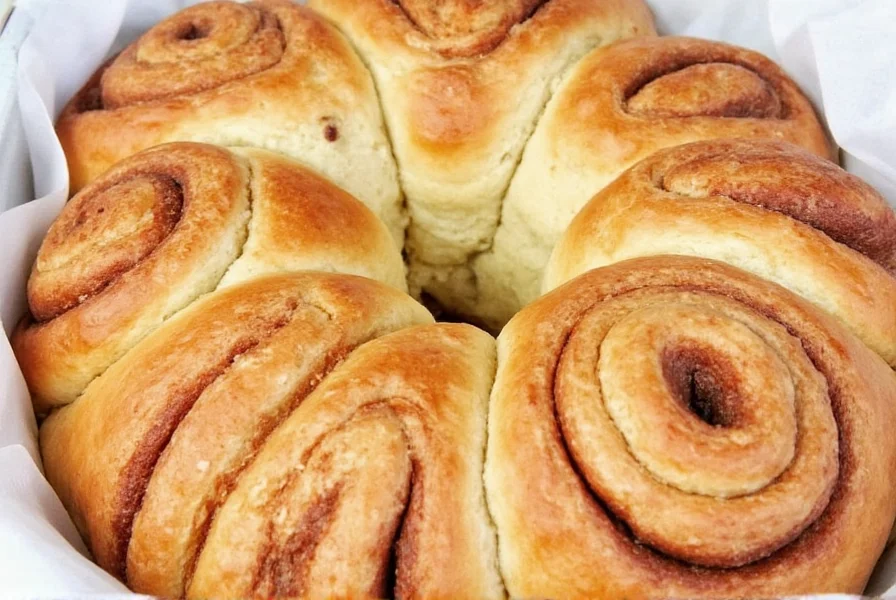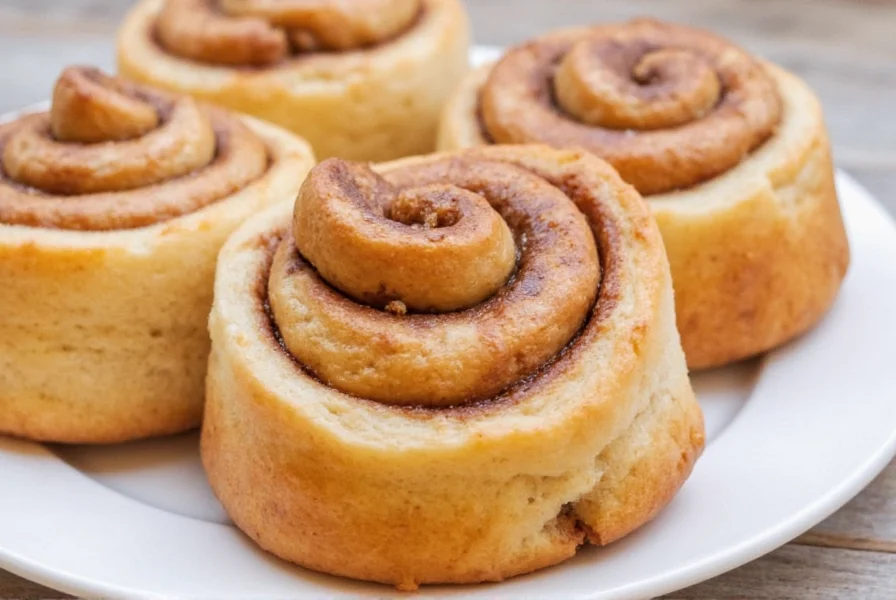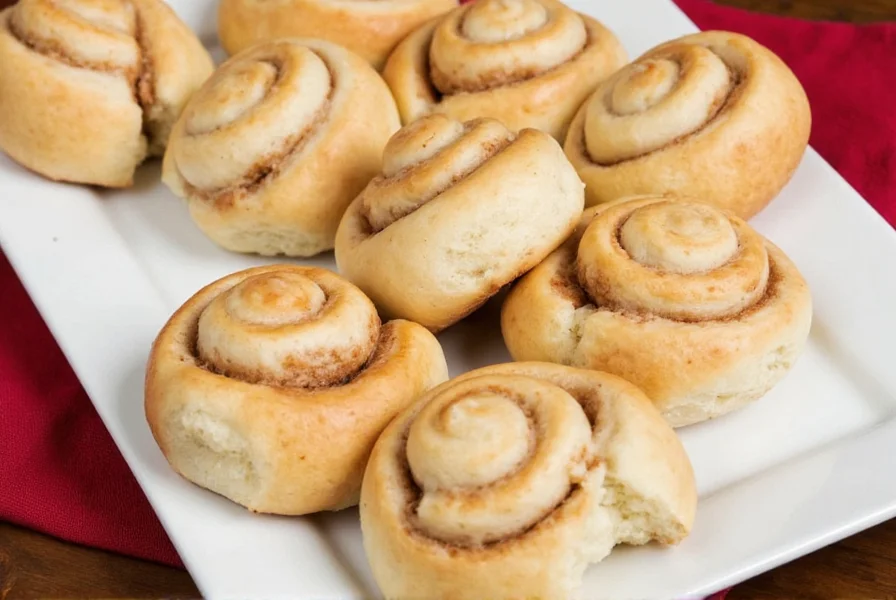Here's a genuinely easy cinnamon bun recipe that requires just 10 simple ingredients, takes 30 minutes of active time, and produces soft, gooey cinnamon buns every time. This beginner-friendly recipe uses standard pantry items, requires no special equipment, and includes clear step-by-step instructions with pro tips for perfect results.
Nothing beats the aroma of freshly baked cinnamon buns filling your kitchen. This easy cinnamon bun recipe has been perfected through years of testing to ensure success for bakers of all skill levels. Unlike complicated recipes that require special ingredients or advanced techniques, this version uses common pantry staples and straightforward methods that guarantee soft, flavorful results without fail.
Why This Easy Cinnamon Bun Recipe Works
Many cinnamon bun recipes promise simplicity but deliver complicated processes or hard-to-find ingredients. This recipe solves those problems by:
- Using active dry yeast instead of fresh yeast (more accessible and stable)
- Requiring only one rise time (saves 1-2 hours compared to traditional recipes)
- Using standard measuring cups instead of requiring a kitchen scale
- Providing clear visual cues instead of strict timing for critical steps
Simple Ingredients for Perfect Cinnamon Buns
This easy homemade cinnamon bun recipe uses ingredients you likely already have. No specialty items required!
| Ingredient | Amount | Key Purpose |
|---|---|---|
| All-purpose flour | 3½ cups + more for dusting | Creates structure without toughness |
| Active dry yeast | 2¼ teaspoons (1 packet) | Reliable leavening for consistent rise |
| Whole milk | 1 cup, warm (110°F) | Activates yeast and adds richness |
| Unsalted butter | ⅓ cup, melted | Creates tender crumb and flavor |
| Granulated sugar | ½ cup | Feeds yeast and balances cinnamon |
| Large eggs | 2 | Binds ingredients and adds structure |
| Salt | 1 teaspoon | Enhances flavor and controls yeast |
For the Cinnamon Filling
- ½ cup packed light brown sugar
- 2½ tablespoons ground cinnamon
- ⅓ cup unsalted butter, softened
For the Cream Cheese Glaze
- 4 ounces cream cheese, softened
- ¼ cup unsalted butter, softened
- 1 cup powdered sugar
- 1 teaspoon vanilla extract
- 1-2 tablespoons milk
Equipment You'll Need
This simple cinnamon roll recipe requires only basic kitchen tools:
- Large mixing bowl
- Stand mixer with dough hook (or hand mixer)
- Rolling pin
- 9x13 inch baking pan
- Sharp knife or dental floss for cutting
Step-by-Step Instructions for Easy Cinnamon Buns
Step 1: Activate the Yeast (5 minutes)
In a small bowl, combine warm milk (110°F is crucial - too hot kills yeast, too cold won't activate it), 1 tablespoon of the sugar, and yeast. Let sit for 5-7 minutes until foamy. This simple test confirms your yeast is active before proceeding.
Step 2: Make the Dough (10 minutes)
In a large bowl or stand mixer, combine flour, remaining sugar, and salt. Add the yeast mixture, melted butter, and eggs. Mix until a shaggy dough forms. Knead for 5-7 minutes by hand or 3-4 minutes with a dough hook until smooth and elastic. The dough should pull away from the sides but still be slightly tacky.
Step 3: First Rise (1 hour)
Cover the bowl with a damp towel and let rise in a warm spot until doubled in size (about 1 hour). Don't rush this step - proper rising creates the light texture cinnamon buns are known for.

Step 4: Prepare the Filling (5 minutes)
Mix brown sugar and cinnamon in a small bowl. Soften the butter for spreading - it should be pliable but not melted.
Step 5: Roll and Fill (10 minutes)
Punch down the risen dough and roll into a 16x12 inch rectangle on a floured surface. Spread softened butter evenly over the dough, then sprinkle with cinnamon-sugar mixture. Starting from the long side, roll tightly into a log. Use dental floss (not knife) to cut into 12 equal pieces for clean slices without squishing.
Step 6: Second Rise and Bake (25 minutes)
Place rolls cut-side down in a greased 9x13 inch pan. Cover and let rise 30 minutes until puffy. Bake at 375°F for 22-25 minutes until golden brown. The internal temperature should reach 190°F for perfect doneness.
Step 7: Make the Glaze (5 minutes)
While buns bake, beat cream cheese and butter until smooth. Gradually add powdered sugar, vanilla, and milk until desired consistency. Drizzle over warm buns.
Pro Tips for Foolproof Cinnamon Buns
- Yeast temperature matters: Use a thermometer to ensure milk is exactly 110°F
- Don't over-flour: Add flour gradually until dough clears the bowl but remains slightly sticky
- Cutting secret: Use unflavored dental floss to slice rolls cleanly without distortion
- Don't overbake: Remove when tops are golden but centers still look slightly soft
- Glaze timing: Apply glaze while buns are warm but not hot to prevent melting
Storage and Serving Suggestions
These easy cinnamon buns are best enjoyed the day they're made, but can be stored:
- Room temperature: Keep in airtight container for up to 2 days
- Refrigerator: Store for up to 5 days (reheat before serving)
- Freezer: Freeze unglazed buns for up to 3 months (thaw and bake when needed)
For the best experience, reheat individual buns in the microwave for 15-20 seconds or warm in a 300°F oven for 5 minutes. Pair with coffee or tea for the ultimate breakfast treat.
Simple Variations for Different Diets
This basic easy cinnamon bun recipe adapts well to various dietary needs:
- Gluten-free: Substitute 1:1 gluten-free flour blend (add 1 tsp xanthan gum)
- Dairy-free: Use coconut oil instead of butter and almond milk
- Vegan: Replace eggs with flax eggs (1 tbsp ground flax + 3 tbsp water per egg)
- Lower sugar: Reduce filling sugar by 25% and use sugar-free glaze

Troubleshooting Common Issues
Even with this foolproof cinnamon roll recipe, occasional issues may arise:
- Dense buns: Usually caused by too much flour or inactive yeast
- Filling leaking: Ensure butter is properly softened but not melted
- Uneven rising: Check oven temperature with separate thermometer
- Dry texture: Overbaking or insufficient fat in dough
Frequently Asked Questions
Can I make this easy cinnamon bun recipe without a mixer?
Yes, you can make this recipe by hand. Mix ingredients in a large bowl with a wooden spoon, then knead on a floured surface for 8-10 minutes until smooth and elastic. The dough should pass the windowpane test - stretch a small piece thin enough to see light through without tearing.
How do I know when cinnamon buns are fully baked?
Cinnamon buns are done when they reach an internal temperature of 190°F on an instant-read thermometer. Visually, they should be golden brown on top, pull away slightly from the pan edges, and feel springy when gently pressed. The center should no longer look wet or doughy.
Can I prepare this recipe the night before?
Yes, you can prepare these cinnamon buns ahead. After shaping, place them in the pan, cover tightly, and refrigerate overnight. In the morning, let them sit at room temperature for 30 minutes before baking. They'll need the full baking time as the dough will be cold.
Why did my cinnamon buns come out tough?
Tough cinnamon buns usually result from too much flour or over-kneading. Measure flour properly by spooning into the cup and leveling off (don't scoop). The dough should be slightly tacky but not sticky. If using a mixer, don't exceed 5 minutes of kneading time.











 浙公网安备
33010002000092号
浙公网安备
33010002000092号 浙B2-20120091-4
浙B2-20120091-4